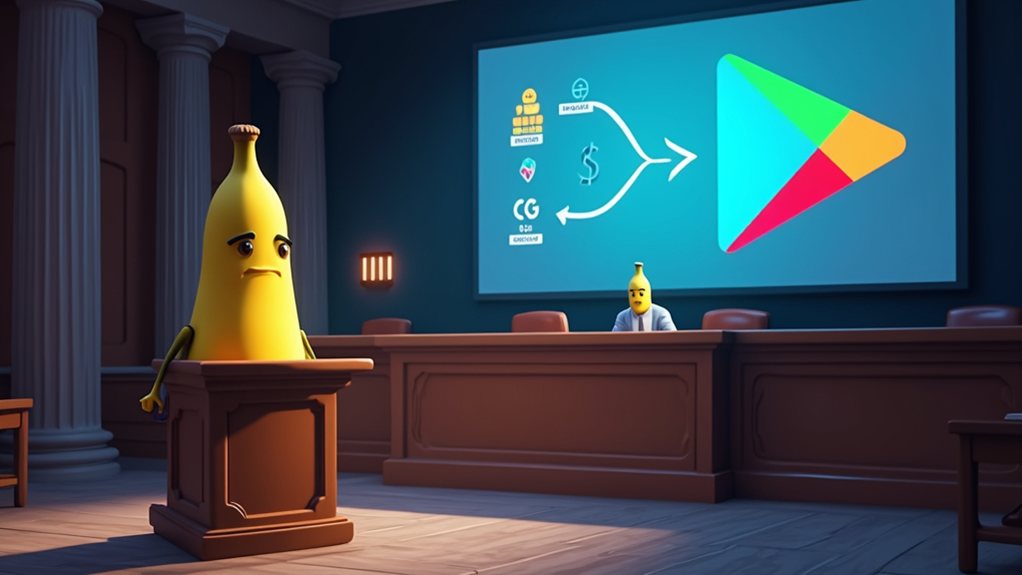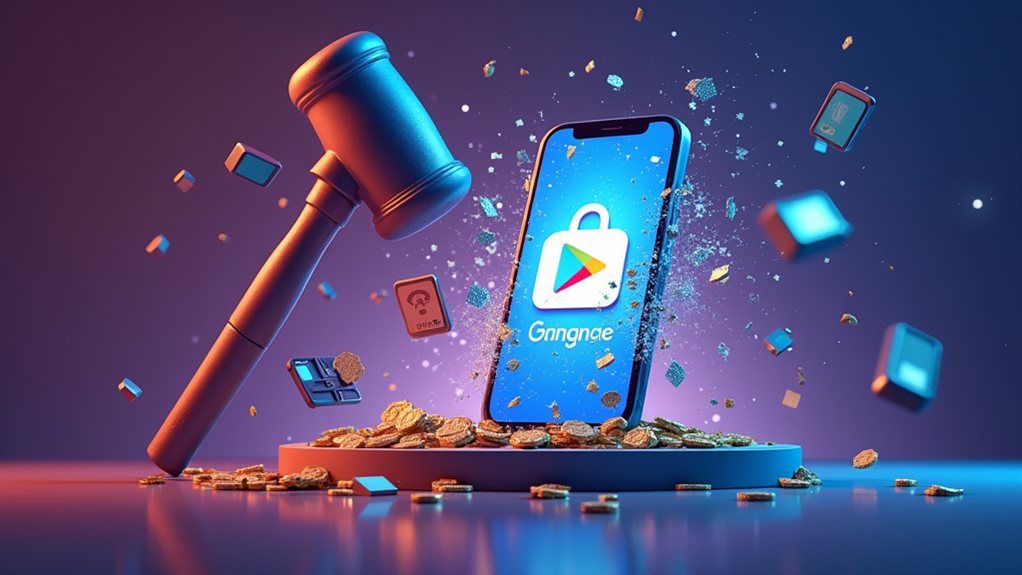Epic Games’ recent court win propels Google Play Store into a payment system overhaul. This landmark ruling dismantles Google’s monopolistic grip, allowing developers to explore flexible pricing options and circumvent hefty commissions. Imagine a world where app creators aren’t shackled by a 30% cut! With an emphasis on competition, this verdict could ripple across app ecosystems, challenging major players like Apple. For app aficionados, the changes could reshape a more robust app environment. What’s next in this evolving saga?
Overview of the Court Ruling

In a landmark decision, a U.S. federal court has ruled that Google must open its Android operating system to rival app stores, effectively shaking the very foundations of its app marketplace dominance.
The Ninth Circuit upheld a lower court’s verdict, mandating changes to Google’s payment systems over three years. This ruling dismantles exclusive agreements and introduces competition, sparking debates about user choice. Notably, the jury found that Google engaged in anti-competitive practices, highlighting the need for reform in their app store operations.
As analysts ponder the ramifications, one wonders: will consumers truly benefit, or is this just a corporate reshuffle?
With Google planning an appeal, the saga of app store supremacy is far from over.
Key Legal Findings Against Google

Google’s Monopoly Crumbles: Key Legal Findings Revealed
A jury’s swift verdict against Google confirms the tech giant’s monopoly violations across the app market. With anti-competitive practices laid bare, the ruling not just dismantles Google’s “walled garden” but likewise demands significant policy changes to restore fair competition. As the dust settles, one question looms: will this landmark case spark a renaissance for innovation in the app ecosystem? The Ninth Circuit’s ruling mandates Google to open its Play Store to competitors, creating a more competitive landscape for developers and consumers alike.
Monopoly Violations Confirmed
A nine-person jury has decisively labeled Google’s Android app store an illegal monopoly, shaking the very foundations of online commerce.
This monumental verdict compels a re-evaluation of app distribution. The court found that Google manipulated its ecosystem, reinforcing its dominance through various means, including:
- Mandatory Play Store installation on all devices
- Exclusive deals limiting app availability to its platform
- Tying the Play Store to its billing system
With this ruling, Google faces a reckoning. The Ninth Circuit’s ruling may soon pave the way for a more competitive landscape in app distribution.
The online environment may soon welcome competition, giving developers and consumers a chance to breathe.
Change is on the horizon—will Google adapt or resist?
Antitrust Evidence Presented
Epic Games has unearthed a treasure trove of evidence revealing Google’s monopolistic stranglehold on the Android ecosystem.
A jury confirmed the existence of distinct markets for app distribution and in-app billing, as evidence showcased Google’s exclusionary tactics that forced third-party apps into the Play Store.
Unlawful tying arrangements tethered the Play Store to Google’s billing system, limiting developers’ freedom.
With a hefty 30% commission that exceeded competitive norms, Google’s practices stifled innovation and consumer choice.
As Epic’s CEO declared a “total victory,” the implications ripple through the tech environment—could this mark the dawn of a more competitive app market? The jury found that Google violated federal and California antitrust law by unlawfully tying the use of the Play Store to Google Play Billing, further highlighting the systemic issues within Google’s operations.
Required Policy Changes
Following a landmark court ruling, the app distribution environment is set for a seismic shift, as Google is now obligated to overhaul its payment systems and developer policies.
This decision opens the floodgates for competition.
- Android users can download rival app stores.
- Google must allow third-party payment methods in the Play Store.
- Developers gain the freedom to communicate pricing outside the Play Store.
Expect a more dynamic app ecosystem where choice reigns supreme.
As Epic Games leads the charge, the question looms: will Google adapt, or will it resist this evolution?
The clock is ticking!
Required Changes to Google Play Store

Google Play Store Faces Major Overhaul Following Court Ruling
In a landmark decision, the court mandates that Google must allow third-party payment systems for Android apps, shaking the foundation of its Play Store.
This shift opens the floodgates for developers, giving them the freedom to communicate pricing and explore alternative distribution avenues without fear of retribution. As the deadline approaches, how will Google adapt to this new environment, and what does it mean for the future of app monetization? With the recent 10% growth in app acquisitions and spending, developers are poised to capitalize on this newfound flexibility.
Mandated App Store Changes
As of March 25, 2025, US Cellular carrier billing will vanish from the Google Play Store‘s payment options, marking a significant shift in how users engage with app purchases. This change compels users to adapt quickly, leaving them with alternative methods such as:
- Major credit card networks: American Express, Discover, Mastercard, and Visa
- Seamless options like Cash App and PayPal
- Timeless Google Play gift cards, which never expire
With subscriptions on the chopping block by March 31, 2026, users must embrace this new reality. Existing users can still use carrier billing for non-subscription purchases until the deadline, but they are advised to switch billing methods as soon as possible.
Will this overhaul make app shopping smoother or more complicated? Only time will tell.
Opening Android Ecosystem
The Google Play Store is gearing up for a seismic shift as it opens its ecosystem to new payment possibilities. By expanding accepted payment methods—think Cash App and PayPal alongside trusty credit cards—the Play Store is redefining convenience. Imagine AI swooping in to suggest the best payment options during pivotal moments. With a mandatory shift to Billing Library version 7, developers will find compliance essential for future-proofing their apps. This change is particularly crucial as self-declaration required for news apps approaches its deadline, emphasizing the need for developers to stay ahead of compliance requirements. As US Cellular phases out, users must adapt or risk service interruptions. Will this transform user experience? Stay tuned; the Android ecosystem is about to get a lot more intriguing.
Impact on Developer Agreements
A monumental shift in developer agreements is on the horizon, thanks to Epic Games’ recent court victory. The ruling mandates significant changes to the Google Play Store‘s payment system, impacting how developers operate.
- Apps can’t be forced to use Play Billing.
- Third-party payment methods are now allowed.
- Developers may communicate pricing outside the Play Store.
As developers gain newfound freedom, they can set independent pricing without Play Billing constraints. This evolution aligns with the recent Play Console updates that focus on improving the overall experience for developers.
Will this herald a trend toward a more open digital marketplace? Only time will tell, but the environment is undeniably evolving.
Background of the Epic Games Lawsuit

Epic Games’ legal battle against Google began with a bold move that shook the app distribution environment. In August 2020, Epic intentionally violated Play Store policies, prompting Google to remove Fortnite.
This swift action ignited a lawsuit, challenging Google’s monopolistic grip on the Android app marketplace. Epic accused Google of enforcing a 30% commission on in-app payments, a hefty toll for developers. In 2024, a jury found Google had illegally monopolized the Android app distribution market.
The stakes skyrocketed, as Epic’s “Project Liberty” aimed to redefine app payment structures. As the courtroom drama unfolded, the implications for developers and consumers alike loomed large, potentially reshaping the future of digital commerce.
Timeline of Legal Proceedings

In a landmark showdown, Epic Games’ legal proceedings against Google unfolded over several pivotal years, reshaping the app ecosystem.
The timeline of this dramatic battle included:
- Epic’s bold initial lawsuit in August 2020, igniting a firestorm.
- A series of amendments, particularly the July 2021 complaint and November 2022 updates.
- Pre-trial maneuvering, leading to a jury trial that began on November 6, 2023.
Ultimately, the jury’s December 11 verdict found Google guilty of antitrust violations.
This case is a watershed moment in tech, challenging monopolistic practices.
Will this reshape app marketplaces forever? Only time will tell.
Reactions From Industry Leaders

Following the historic court ruling favoring Epic Games, industry leaders are buzzing with reactions that signal a potential seismic shift in the app marketplace.
Epic CEO Tim Sweeney triumphantly hailed the decision as a “total victory,” promising the launch of the Epic Games Store on Android. Starting November 1, 2024, third-party app stores will be accessible to Android users, enhancing competition in the ecosystem.
Meanwhile, Google responded with an appeal, citing concerns over user safety and potential fragmentation.
This clash isn’t just about Epic and Google; it could redefine how gaming developers navigate app distribution.
As the dust settles, the industry watches closely—will this open the floodgates for competitive alternatives, or will it spark a protracted legal battle?
Implications for App Developers

With a court ruling reshaping the rules of engagement on the Google Play Store, app developers now face an unprecedented opportunity to redefine their revenue strategies. The mandate opens doors to diverse payment options, challenging the status quo.
- Flexible payment processing allows integration of various methods.
- Direct user communication about payment alternatives improves transparency.
- Revenue structures can shift dramatically with reduced reliance on Google’s commission. The integration of the Google Play Billing Library will be essential for developers to manage payments effectively in this new landscape.
This environment raises questions: Will developers seize the moment, or tread cautiously?
The setting has changed, and adaptation is the name of the game. The future is ripe for innovation.
Future Legal Challenges for Google

Google’s Legal Maze: Maneuvering Future Challenges Ahead
A federal appeals court has granted Google a temporary stay, pausing mandatory Play Store changes. This legal reprieve buys time but highlights a tangled web of future challenges.
From ongoing battles with Epic Games to scrutiny from India’s Supreme Court, Google faces a multi-front war. Global regulators are circling, seeking compliance amidst varied standards. With Cross-appeals from Google, CCI, and ADIF pending in the Supreme Court, the stakes are even higher for the tech giant.
With appeals prolonging legal battles, the potential for inconsistent rulings looms large. Each outcome could set new precedents, reshaping app store dynamics worldwide.
Will Google navigate this storm, or will its empire face a shake-up? Only time will tell.
Impact on User Experience and Safety

As third-party app stores gain direct access to the Google Play ecosystem starting November 2024, the user experience is set for a radical transformation.
- Sideloading steps vanish, eliminating 21-step security warnings.
- Access to alternative app stores becomes straightforward, no APK hunting required.
- Communication about external payment options may spark confusion. Moreover, Google must open the Play Store to increased competition, which could lead to a wider variety of apps being available.
However, with greater choice comes risk. Google warns of potential safety declines, citing Android’s openness.
Will users face malware threats lurking in external links? As app discovery evolves, the balance between convenience and safety hangs in the balance, leaving users to navigate a new environment.
Significance for Antitrust Enforcement

Antitrust Terrain Shifts as Epic Games Wins Against Google
Epic Games’ recent court victory not only disrupts the Google Play Store payment system but additionally redefines antitrust enforcement in the tech world. This ruling could reshape how digital platforms are scrutinized, challenging the monopolistic practices of giants like Google and Apple. As the legal terrain evolves, the implications for both developers and consumers are monumental—will this be the catalyst for a more equitable digital marketplace? The Ninth Circuit Court of Appeals decision mandates Google to revamp its Play Store, paving the way for increased consumer choices.
Antitrust Legal Precedents
A landmark ruling has redefined the terrain of antitrust enforcement, particularly in the domain of online platforms.
The court’s decision on Google’s practices sets significant legal precedents:
- Broader market definitions for online platforms now prevail.
- Mandatory billing systems under monopoly power are deemed per se unlawful.
- Distinct legal standards for platforms strengthen plaintiffs’ claims.
In a world where tech giants often operate in grey areas, this ruling shines a light. It empowers developers and clarifies antitrust strategies, especially as the ruling reinforces findings of Google’s illegal monopoly in app distribution. As the online environment evolves, these precedents could reshape competition and innovation.
What will this mean for the next app revolution? Only time will tell.
Impact on Tech Industry
Epic Games’ recent court victory against Google has sent shockwaves through the tech environment, compelling a reevaluation of app store business models.
With Google now required to dismantle anti-steering restrictions and embrace third-party distribution, the terrain is shifting.
This isn’t just a Google problem; Apple’s App Store could soon face similar scrutiny. Developers are gaining newfound freedom, potentially bypassing exclusive payment systems. Google’s efforts to restrict access to alternatives have entrenched its dominance, but this ruling may catalyze a fairer app distribution landscape.
The ripple effect? A potential $2 billion annual revenue loss for Google if others follow Epic’s lead.
As regulators observe closely, the industry is bracing for a future where competition thrives—and old business models crumble.
